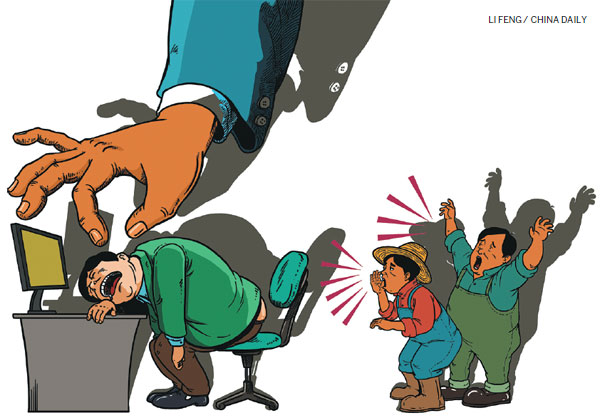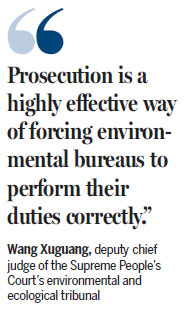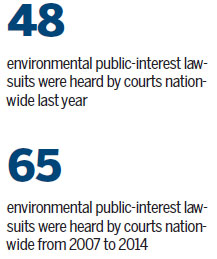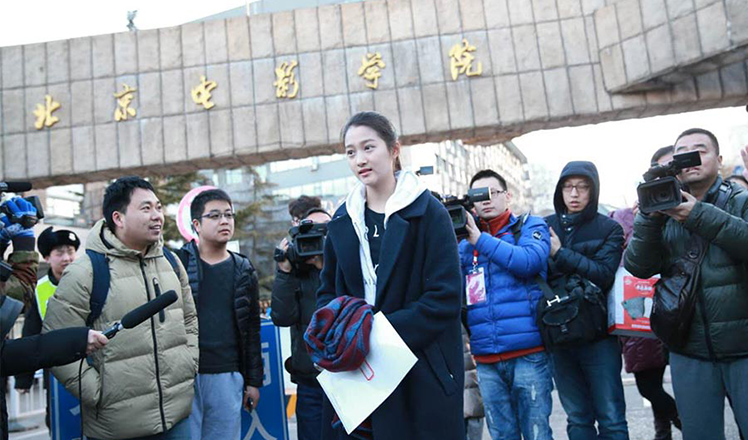Failing eco-protection bureaus in the firing line
Updated: 2016-02-17 08:21
By Cao Yin(China Daily)
|
||||||||
China's revised law on pollution control allows a wider range of litigants to bring cases against government departments that neglect their duties. Cao Yin reports.
Legal experts are predicting a rise in the number of public-interest lawsuits brought by local procuratorates against environmental departments that fail to address pollution control or enforce laws designed to prevent environmental damage.
Under China's revised Environmental Protection Law, which came into effect on Jan 1 last year, local authorities, NGOs and related organizations were for the first time given the right to bring public-interest cases against provincial and lower-level environmental departments accused of incompetence. Before the new law, only individuals or residents' groups were allowed to bring cases of this type.

Last month, Wang Ruiping, a chief judge at Fuquan court in Guizhou province, handed down a ruling in the first case of its kind in Chinese legal history. The local procuratorate sued the environmental bureau in Jinping county, accusing it of ignoring water pollution caused by illegal discharges from local factories and also failing to enforce the relevant laws. Wang ordered the bureau to rectify its failings and ensure that the laws are enforced.
"It was not a complicated case because the facts were clear and there was compelling evidence. However, the importance of the case cannot be ignored because it was the first time that a prosecuting authority had acted as a litigant and lodged an administrative public-interest lawsuit under a pilot program," Wang said, referring to a trial project designed to give a wider range of litigants the opportunity to bring lawsuits against government departments.
Since the revised law, Chinese toughest-ever measure against pollution and environmental damage, took effect, NGOs have been given the right to bring civil public-interest cases, which has resulted in a rapid rise in the number of cases being heard by the courts.
A growing trend
Last year alone, courts nationwide heard 48 environmental public-interest lawsuits, but from 2007 to 2014 the number was just 65, according to statistics provided by the Supreme People's Court.
Three of the 48 cases were classified as "administrative" lawsuits, meaning local prosecutors sued environmental departments, which faced fines and court orders if found guilty. Wang Xuguang, deputy chief judge of the top court's environmental and ecological tribunal, said it's likely that many more administrative lawsuits will be brought.
In July, the Standing Committee of the National People Congress, the top legislative body, allowed prosecutors in 13 provinces and municipalities, including Guizhou, to initiate a two-year pilot program to encourage the growth of administrative public-interest cases, he said.
That means prosecutors can play a bigger role in supervising environmental departments by bringing public-interest lawsuits, he added. "Prosecution is a highly effective way of forcing environmental bureaus to perform their duties correctly. To them, it is a bigger threat than cases brought by NGOs," he said.
Luo Chaoguo, chief judge of the environmental and ecological tribunal at the Guizhou Provincial High People's Court, said the new legislation is proving effective and confirmed that the province has just accepted a second administrative environmental public-interest case.
"This new case has been brought by a prosecuting authority, which is accusing a township government of ignoring pollution caused by a local waste-disposal plant," Luo said.
The new legislation is piling greater pressure on environmental departments, and the pilot program has won the backing of the Ministry of Environmental Protection, which said it has ordered environmental bureaus at all levels to cooperate with procuratorates and to ensure adherence to the law.
"Every environmental bureau must deal with pollution rigorously and enforce the law. They must also identify loopholes in their supervisory duties and learn the lessons provided by the case details when they are published," according to a statement released by the ministry.
"As law enforcement departments, we must regulate our supervisory procedures ourselves and improve the transparency of our working models," it added.
Law enforcement
However, the ministry has conceded that a number of environmental departments have experienced difficulties in enforcing the law, partly because law enforcement offices are understaffed, but also as a result of violent resistance by some polluters.
On Sept 9, seven people, including members of an air protection supervisory team, were attacked by a group of men as they prepared to inspect a factory in Jinan city, Shandong province, that was suspected of emitting pollutants. Five people were injured in the 10-minute attack, according a statement by the ministry.
Chen Jining, minister of environmental protection, said the perpetrators would be identified and punished, and that greater protection would be provided for law enforcement teams.

Huang Desheng, a researcher at the ministry's Policy Research Center for the Environment and Economy, told the ministry's in-house newspaper that cleanup and protection efforts have been hampered by a lack of funding and low staff numbers in some areas.
In a small number of rural areas, those problems have been exacerbated by the failure of the local authorities to coordinate their efforts with other government departments and by uncertainty about their legal obligations. "The result was that some environmental bureaus failed to solve pollution problems, and their lack of understanding of their duties also affected the efficiency of law enforcement," Huang said.
Not every failing environmental department will be prosecuted, according to the Supreme People's Procuratorate, which said some offenders would be issued with judicial warnings before action is taken.
Judicial advice
In January, the top procuratorate published details of three typical environmental public-interest lawsuits brought by local authorities, including the one in Guizhou, and outlined the legal advice given to environmental departments.
According to a report on Infzm, the website of Southern Weekly in Guangdong province, prosecuting authorities will send legal advice to environmental departments before a prosecution is brought, with the aim of conserving judicial resources and to give failing departments a shot across the bows.
By January, warnings and advice had been issued to seven environmental bureaus judged to be reluctant in dealing with pollution, forcing them to act against polluting businesses. The bureaus were also required to submit written explanations of their actions within a month of receiving the warning, the report said.
According to the procuratorate, the bottom line is that environmental departments that fail to rectify their oversights in line with the advice will be publicly criticized and sued.

Luo, the judge, said lawsuits brought by NGOs can also play a role in forcing environmental departments to pay greater attention to law enforcement. "The more diversified the range of litigants becomes, the bigger the effect on environmental bureaus will be. That will ensure they play their full role in environmental protection," he said.
Late last year, two NGOs, including Friends of Nature, an environmental group in Beijing, won a public-interest case they brought to force factories in Nanping, Fujian province, to pay 1.27 million yuan ($198,730) toward the restoration of forests damaged by illegal discharges of pollutants.
Luo said the wider range of litigants will help to effectively protect the environment and make environmental restoration a priority, but he stressed that the use of public-interest cases is still being explored, especially administrative cases brought by local prosecutors.
"How big a role public-interest lawsuits will play and whether the pilot will prove to be an effective measure remains to be seen," he said.
Contact the writer at caoyin@chinadaily.com.cn
Three recent public-interest cases
1. On Dec 18, authorities in Jinping county, Guizhou province, brought an administrative public-interest lawsuit to force the local environmental protection bureau to deal with pollution caused by illegal discharges from seven stone-processing plants.
The county court ordered the bureau to enforce the law, supervise the plants and clear up the pollution as quickly as possible.
2. On Dec 16, prosecutors in Qingyun county, Shandong province, filed a case against the local environmental department, alleging that it had ignored illegal discharges from business premises, which polluted local water resources.
Although the department has been issued with notices warning of potential prosecution, the problem has remained unsolved.
The case has been accepted by the county court and will be heard at a later date.
3. On Dec 21, prosecutors in Qingliu county, Fujian province, brought a case against the local environmental department, claiming that it had failed to impose fines on businesses that burned garbage in contravention of the environmental laws. The case will be heard by a court in Mingxi county.
(China Daily 02/17/2016 page6)
- Chinese military sets up corruption hotline
- Foreigners working in Beijing can now buy apartments immediately
- Thousand-year-old temple seeks new media talents
- First train from China to Iran stimulates Silk Road revival
- Big data for Spring Festival: 8m overseas trips, etc
- Winter swim enthusiasts celebrate the Year of the Monkey
- 2016 Westminster Kennel Club Dog Show held in New York
- Pakistan confirms participation in Saudi-led military drills
- Jeb Bush gets a brotherly hand from George W. in S. Carolina
- Jail term begins for former Israeli PM Olmert
- Record-setting cold chills US Northeast
- Chinese, ROK officials to discuss Korean Peninsula issue

 Excitement, charm and grace: Chinese New Year in UK
Excitement, charm and grace: Chinese New Year in UK
 Taylor Swift wins Album of the Year at Grammys
Taylor Swift wins Album of the Year at Grammys
 Stars spotted at film academy exam in China
Stars spotted at film academy exam in China
 Record number of Chinese travel abroad for Spring Festival
Record number of Chinese travel abroad for Spring Festival
 Future bodyguards undergo brutal training in Beijing
Future bodyguards undergo brutal training in Beijing
 Chinese Lunar New Year marked in central London
Chinese Lunar New Year marked in central London
 Top 10 most difficult cities in China to get a taxi
Top 10 most difficult cities in China to get a taxi
 Sichuan opera charms British children
Sichuan opera charms British children
Most Viewed
Editor's Picks

|

|

|

|

|

|
Today's Top News
Will US-ASEAN meeting be good for region?
Accentuate the positive in Sino-US relations
Dangerous games on peninsula will have no winner
National Art Museum showing 400 puppets in new exhibition
Finest Chinese porcelains expected to fetch over $28 million
Monkey portraits by Chinese ink painting masters
Beijing's movie fans in for new experience
Obama to deliver final State of the Union speech
US Weekly

|

|







